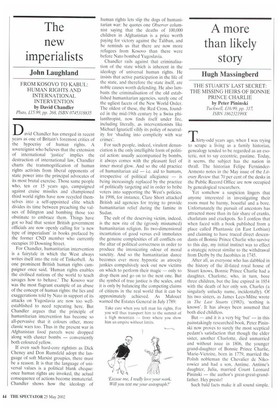imperialists
John Laughland
FROM KOSOVO TO KABUL: HUMAN RIGHTS AND INTERNATIONAL INTERVENTION by David Chandler
Pluto, .f15.99, pp. 268, ISBN 0745318835
David Chandler has emerged in recent years as one of Britain's foremost critics of the hypocrisy of human rights. A sovereignist who believes that the extension of international 'justice' implies the destruction of international law, Chandler charts the transmogrification of human rights activists from liberal opponents of state power into the principal advocates of its most brutal exercise. Those same people who, ten or 15 years ago, campaigned against cruise missiles and championed third world rights have now recycled themselves into a self-appointed elite which divides its time between preaching the values of Islington and bombing those too obstinate to embrace them. Things have got so bad that senior British government officials are now openly calling for 'a new type of imperialism' in books prefaced by the former CND member who currently occupies 10 Downing Street.
For Chandler, humanitarian intervention is a fairytale in which the West always writes itself into the role of Tinkerbell. As one prominent British human rights campaigner once said, 'Human rights enables the civilised nations of the world to teach savages how to behave.' The Kosovo war was the most flagrant example of an abuse of the concept of human rights: the lies and exaggerations told by Nato in support of its attacks on Yugoslavia are now too wellestablished to need repeating here. But Chandler argues that the principle of humanitarian intervention has become so all-pervasive that it colours other, more classic wars too. Thus in the present war in Afghanistan food parcels were dropped along with cluster bombs — conveniently both coloured yellow.
If even such hard-core rightists as Dick Cheney and Don Rumsfeld adopt the language of soft Marxist groupies, there must be a reason. It is that the language of universal values is a political blank cheque: once human rights are invoked, the actual consequence of actions become immaterial. Chandler shows how the ideology of
human rights lets slip the dogs of humanitarian war: he quotes one Observer columnist saying that the deaths of 100,000 children in Afghanistan is a price worth paying for victory against the Taliban, and he reminds us that there are now more refugees from Kosovo than there were before Nato bombed Yugoslavia.
Chandler rails against that criminalisation of the state which is inherent in the ideology of universal human rights. He insists that active participation in the life of the state, and therefore the state itself, are noble causes worth defending. He also lambasts the criminalisation of the old established humanitarian agencies, surely one of the ugliest facets of the New World Order. The oldest of these, the Red Cross, founded in the mid-19th century by a Swiss philanthropist, now finds itself under fire, including literally, as interventionists like Michael Ignatieff vilify its policy of neutrality for 'shading into complicity with war crimes'.
For such people, indeed, virulent denunciation is the only intelligible form of political action: usually accompanied by bombs, it always comes with the pleasant feel of inner moral glow. And so the old practice of humanitarian aid — i.e. aid to humans, irrespective of political allegiance — is being increasingly replaced by the practice of politically targeting aid in order to bribe voters into supporting the West's policies. In 1998, for instance, Clare Short attacked British aid agencies for trying to provide humanitarian relief during the famine in Sudan.
The cult of the deserving victim, indeed, is the new rite of the (grossly misnamed) humanitarian religion. Its two-dimensional incantation of good versus evil immolates the genuine complexities of all conflicts on the altar of political correctness in order to produce the intoxicating odour of moral sanctity. And so the humanitarian dance becomes ever more hypnotic as atrocity junkies compulsively seek out new victims on which to perform their magic — only to drop them and go on to the next one. But the symbol of true justice is the scales, and it is only by balancing the competing claims of citizens in the real world that it can be approximately achieved. As Malouet warned the Estates General in July 1789:
Take care when you tell man his rights. For you will thus transport him to the summit of a high mountain — from where you show him an empire without limits.






















































































 Previous page
Previous page